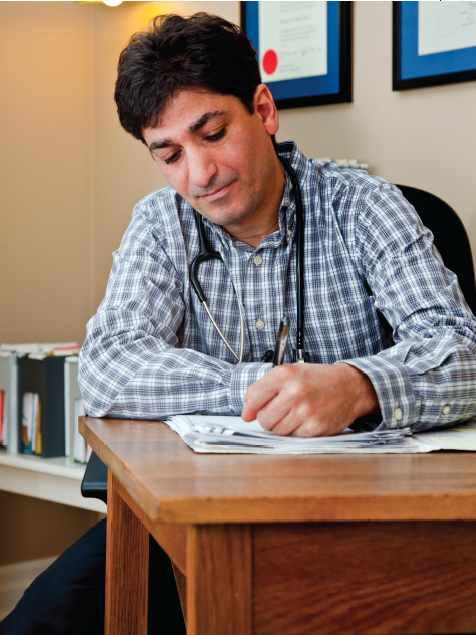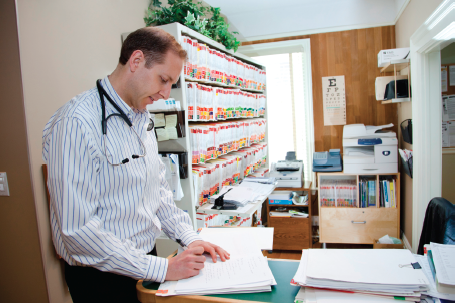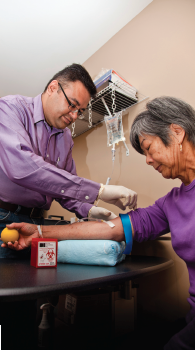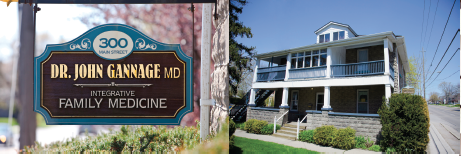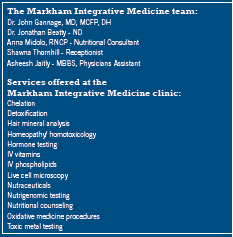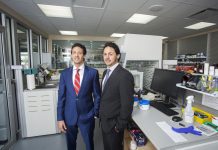Dr John Gannage, MD
Markham Integrative Medicine
The pace with which awareness and interest in Integrative Medicine grows is staggering. Interacting with healthcare providers and patients over the course of a decade has clearly revealed this. The likelihood of a patient receiving words of caution from their family physician when informed of their decision to visit an integrative practitioner a decade ago was guaranteed to be greater than 90%. Seemingly with every passing year this number decreases. As a naturopathic doctor I have personally witnessed an encouraging increase in family physicians taking the time to contact me seeking information on the strategy adopted for a patient under both of our care.
There are invariably dozens of reasons contributing to this shift in attitude towards integrative systems of care. Improved regulatory standing and publicized broad scope of practice for integrative healthcare providers is a strong contributing force. Non- invasive and generally safe treatment strategies are also key. Most physicians interviewed by IHP who recently developed an interest in the area commonly site patient inquiry as a strong motivating force.
An understated contribution to the tremendous success of the integrative medicine movement is the pioneering efforts of conventionally trained physicians who made the decision to apply integrative medicine techniques decades ago, when many professionals in the field were still dealing with patients who requested arriving at the clinic through the back door located in the alley.
Dr John Gannage, MD, opened the Markham Integrative Medicine clinic in 1998, delivering the true essence of integrative, patient- centred healthcare since opening day. John represents a rare type of physician; conventionally trained yet devoted to philosophies of holistic care from the time his training in medicine began. He represents the present and future of integrative healthcare; world- class assessment and diagnostic skills used to construct an individualized holistic treatment plan. While conventionally trained physicians who adopt such an approach are increasing in number, finding one who has been in practice for more than a decade is truly rare. Each and every time I come across such a healer I am amazed at how simple the process of evolution to a “holistic” practitioner really is; simply expose an open- minded physician to quality evidence of application of natural therapeutics. The physician seems to do the rest on their own.
Dr Gannage went to medical school at the University of Toronto (1990 graduate) and followed this with residency training at the University of Ottawa. He describes his interest in integrative medicine coinciding with his arrival at the University of Toronto. John expressed frustration with the lack of patient centred care he observed. By 1995 he was working with chiropractors and osteopathic doctors in the field of sports medicine as a strategy to expose himself to different management systems. John felt his training in conventional medicine afforded powerful assessment tools but failed to provide sufficient options for treatment. He described a desire to expand his medicine bag, completing two diplomas in homeopathy as well as receiving training in chelation therapy, several integrative assessment procedures, and registering as a DAN! doctor, identifying a specialty in integrative management of autism.
As with many practitioners of integrative medicine, John describes a personal health crisis as an instrumental factor in the manner in which he delivers patient management today. Two separate visits over a two+ year period to a golf course produced severe, acute, potentially life- threatening illness. Following the first event Dr Gannage assumed he may have a severe sensitivity to pesticide exposure. Following a complete recovery from the first event, he confirmed his earlier suspicions with the onset of the second event. Environmental medicine has thus become a principle focus of the Markham Integrative Medicine clinic, with the clinic having an established reputation for offering of chelation services.
Chelation services vary widely in specific application. Most interestingly, the clinic played an instrumental role in the continued success of the ongoing TACT trial (trial to assess chelation therapy). This large, multicentre trial to assess a combination chelation protocol of EDTA, vitamin C, B vitamins, and magnesium for impact on progression of atherosclerosis was experiencing difficulties in patient recruitment in its early phases. There was concern that the trial was going to be discontinued.
Dr Gannage was able to quickly register the facility as a satellite clinic of TACT and enroll its first patient. At this critical time in the trials progress, investigators were able to announce that the trial was now a multinational trial and that the first international satellite clinic had successfully recruited its first patient into the trial. The protocol entails a three hour drip, a strong contributor to difficulties in patient recruitment. The results of TACT are eagerly awaited by many members of the integrative medical community.
In addition to offering EDTA chelation for patients with cardiovascular disease, Dr Gannage describes with passion the importance of heavy metal chelation (using DMPS, DMSA) for a wide array of common patient presentations. He feels the causal/ progressive role of heavy metals in many common pathologies is erroneously ignored, and reports tremendous success through applying heavy metal chelation in such cases. Heavy metal chelation is frequently applied to cases of autism and other autistic spectrum disorders, neurodegenerative diseases (dementia, Alzheimer’s, Parkinson’s, Huntington’s, MS, etc…), and several types of autoimmune disease (chronic fatigue syndrome, fibromyalgia, scleroderma, rheumatoid arthritis).
The essential basics of an integrative system of practice are evident throughout the clinic and in application of patient management. Food sensitivity testing and subsequent elimination diet strategies are a core treatment modality. A broad array of integrative diagnostic tools are used, including urinary organic acid testing, salivary hormone profiles, hair mineral analysis/ provocative urinary heavy metal assessment, assessment of whole- body oxidative load, live cell microscopy, nutrigenomic testing, and others. The strong interest in environmental medicine has seen the facility establish an important reputation as a centre for support of amalgam removal procedures.
Dr Gannage has expanded the healthcare team of the Markham Integrative Medicine clinic to include a naturopathic doctor (Jonathan Beatty) and a Registered Nutritional Consultant/ holistic whole foods teaching chef (Anna Midolo). While graetful for his dedication to “retrain” himself, Dr Gannage informed IHP that he advises colleagues to “bring a naturopath on board” rather than undergo the retraining themselves. He emphasizes the combined application of conventional medical practices with a team naturopath simply achieves better patient outcomes. Jonathan Beatty, ND, described to us an immense gratitude for the intensive training he has since received particularly in the realm of autism. This recent Canadian College of Naturopathic Medicine grad has had the privilege of exposure to a large number of cases of autism in a relatively short period of time, able to interact with patients at all stages of treatment, from those initiating an integrative approach to those who have been under Dr Gannage’s care for many years.
The Markham Integrative Medicine clinic calls a heritage home on historic Main Street Markham its home. The home has a unique history, serving as a hospital for patients with cancer in 1911. Dr Gannage converted the home into the clinic in 1998, with several efforts made to make the home tolerable by individuals with multiple chemical sensitivities. A state- of- the- art air recirculation system, avoidance of any furniture or building materials made from particle board, refinishing of the original hardwood floors present in the home, and low VOC finishes and paint are a handful of the efforts made to this effect.
Dr Gannage has recently undertaken the responsibility of overseeing a satellite clinic. NEX Health in Burlington, Ontario, was founded by the late Dr Johann Strobele, who, like Dr Gannage, was among the pioneers of conventionally- trained medical doctors to adopt integrative techniques of patient management. Through Dr Gannage’s willingness to work with the NEX Health team, Dr Strobele’s important work and the patients that have come to rely on his system of practice can continue to be served. We hope in time Dr Gannage and other conventionally- trained practitioners of integrative medicine will consider expanding their director role of satellite clinics, perhaps allowing for a cooperative system of practice between ND and integrative MD as currently exists between MD and nurse practitioner.
IHP is grateful to Dr Gannage and the entire team of the Markham Integrative Medicine clinic for allowing us to showcase their important work to you. The most direct route to better recognition, regulation, and implementation of integrative medicine is to increase the number of practitioners of the discipline. The more patients whose lives are benefited by integrative medicine, the more levels of government, academic institutions, and conventionally- trained physicians will feel compelled to work collaboratively. Pioneers like Dr Gannage have allowed the path of a newer generation of integrated healthcare provider to be much easier. Their tireless efforts have made integrative medicine a household name, a far cry from the state of practice for such practitioners a decade or two ago.
